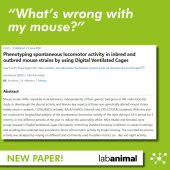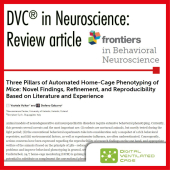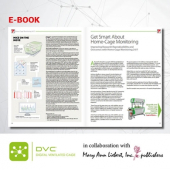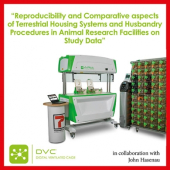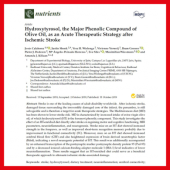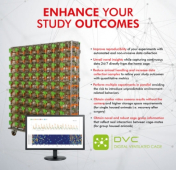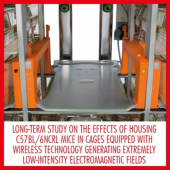// 11 December 2025
The study demonstrates that continuous DVC® home-cage monitoring can quantify urination through precise bedding-moisture dynamics, generating a noninvasive Polyuria Index that shows a strong correlation with hyperglycemia in mouse models of diabetes. This digital biomarker enables earlier and more reliable...
Read All...
// 26 August 2025
New Biology of Sex Differences study using our Digital Ventilated Cage (DVC®) shows female APP23 Alzheimer’s mice become ≈20 % more active and burn extra energy 3–4 months before any amyloid plaques, driving a three‑fold rise in early deaths.
BioMed Central Continuous,...
Read All...
// 15 July 2025
Rutgers researchers showed that Tecniplast’s AI-equipped DVC cages, guided by the Bedding Status Index, spotted soiled bedding with >90% accuracy in five-mouse cages and 76% for singletons.
This real-time insight let them stretch cage-change intervals from the usual 2 weeks to 3–6 weeks without raising...
Read All...
// 15 July 2025
New Aging Cell study harnessed Tecniplast’s DVC® home-cage system to track 5xFAD Alzheimer’s mice 24/7, showing that neuronal HuD knock-out sharply reduces β-amyloid plaques and restores normal night-time activity.
These results spotlight DVC®’s hands-off behavioural analytics as a fast,...
Read All...
// 21 March 2025
A new study from Aarhus University has demonstrated the effectiveness of Digital Ventilated Cages (DVC®) by Tecniplast in detecting early signs of Parkinson’s disease in animal models. Researchers identified reduced spontaneous cage activity, indicative of hypolocomotion, weeks before conventional behavioral...
Read All...
// 11 February 2025
A recent publication in Scientific Reports has confirmed the effectiveness of the DVC® system in monitoring circadian rhythms in mice. Researchers utilized the DVC® to continuously and non-invasively track locomotor activity under various light conditions, including standard light-dark cycles and constant...
Read All...
// 11 February 2025
In a recent study, the Digital Ventilated Cage (DVC®) system enabled continuous, non-invasive monitoring of mice with LRP1 deficiency in skeletal progenitor cells. This monitoring revealed that these mice exhibited significantly reduced locomotor activity compared to controls, highlighting the DVC® system's...
Read All...
// 17 January 2025
Tecniplast's Digital Ventilated Cage (DVC®) system transforms neurodegenerative disease research. Researchers can detect early motor function decline by enabling continuous, non-intrusive monitoring of laboratory mice, providing critical insights into disease progression and potential therapeutic...
Read All...
// 17 January 2025
The DVC® system by Tecniplast is proving invaluable in oncology research. Recent studies demonstrate its ability to detect subtle changes in locomotor activity in mouse models of lung cancer, facilitating early symptom detection and monitoring of treatment efficacy.
Read the full article
Read All...
// 17 January 2025
Tecniplast's DVC® system is advancing aging research through continuous home-cage monitoring. Studies tracking mice over extended periods have uncovered significant patterns in activity and rest disturbances, offering more profound understanding of the aging process and associated health implications....
Read All...
// 13 November 2024
We’re pleased to share that a recent study in Frontiers in Neuroscience highlights the effectiveness of Tecniplast’s Digital Ventilated Cage (DVC®) system in monitoring mouse models for Alzheimer’s, diabetes, and obesity. Led by Rongwan Sun et al., the research confirms that the DVC® system offers...
Read All...
// 13 November 2024
We’re pleased to share new findings from Frontiers in Behavioral Neuroscience showcasing Tecniplast’s Digital Ventilated Cage (DVC®) system as a game-changer in animal welfare monitoring! The study by Mazyar Abdollahi Nejat et al. used the DVC® system to continuously monitor the activity of mice after...
Read All...
// 16 January 2024
In a groundbreaking study, scientists used Tecniplast’s Digital Ventilated Cages (DVC®) to assess the neurological effects of the Pandemrix vaccination on mice. The study revealed a significant reduction in Hcrt mRNA expression, a potential indicator of narcolepsy type 1 (NT1), while DVC® technology showed no...
Read All...
// 8 January 2024
Revolutionizing tendon healing research, a new study published in 'Frontiers in Veterinary Science' highlights the pivotal role of Tecniplast's DVC® technology in monitoring mice for Achilles tendon recovery. The research reveals a significant correlation between the mice's activity levels and...
Read All...
// 30 October 2023
In a groundbreaking study published in the European Journal of Neuroscience, researchers from the University of Copenhagen have unveiled fascinating insights into the effects of sickness on the brain. But what's behind this cutting-edge research? The answer: Digital Ventilated Cages (DVC®) by Tecniplast!...
Read All...
// 10 October 2023
Unlocking Novel Preclinical Biomarkers in Cancer Research with Tecniplast's DVC®" In the recent groundbreaking publication in Cancers 2023 , Stéphane Terry, Céline Gommet, and their team have highlighted the transformative potential of Tecniplast's Digitally Ventilated Cage (DVC®) in oncology studies....
Read All...
// 9 August 2023
Mainz, 6-8 September 2023 - The upcoming GV-Solas conference is set to cast a spotlight on the revolutionary contributions of Digital Ventilated Cages (DVC®) technology, promising exciting insights into animal management and research.
Evaluierung eines Digitalen Käfigsystems by V. Neuert Session G11 -...
Read All...
// 14 July 2023
In a groundbreaking study titled "Microglial Nogo delays recovery following traumatic brain injury in mice", researchers have utilized Digital Ventilated Cages (DVC®) or home cage monitoring to track the behavior of mice post Controlled Cortical Impact (CCI) treatment.
The DVC® system, a cutting-edge...
Read All...
// 14 July 2023
In a groundbreaking study, researchers have leveraged the Digital Ventilated Cage (DVC®) system to characterize the behavioral patterns of different mouse strains in a novel way. The study by Sara Fuochi and her team focused on three widely used mouse strains—C57BL/6NCrl, BALB/cAnNCrl, and CRL:CD1(ICR).
The...
Read All...
// 4 July 2023
Latest Research Harnesses Tecniplast's DVC® for Novel Insights into Mouse Behaviour" In a groundbreaking study recently published in PLOS ONE, scientists have utilized DVC® system to examine the rest and activity patterns of C57BL/6J mice. The study provides novel insights into the behaviour of mice,...
Read All...
// 31 May 2023
In the rapidly evolving field of sleep disorder research, the Digital Ventilated Cage (DVC®) technology has emerged as a significant innovation, offering a non-invasive solution for monitoring narcolepsy type 1 (NT1) phenotypical features in mice. This breakthrough, highlighted in a recent study published in the...
Read All...
// 31 May 2023
Scientists from The Francis Crick Institute and UCL Queen Square Institute of Neurology have made groundbreaking strides in understanding epilepsy's genetic complexities, specifically focusing on CDKL5 deficiency disorder (CDD). Their innovative work, recently published on bioRxiv, leverages state-of-the-art...
Read All...
// 12 April 2023
A new study on obesity's impacts on brain structure and exercise's preventive effects relied on Tecniplast's Digital Ventilated Cage (DVC®) device. The DVC® system provided an ideal environment for mice to be monitored and exercised using the DVC Running Wheel. This cutting-edge tool assessed how...
Read All...
// 3 March 2023
A recent study on myotonic dystrophy type 1 (DM1) and sleep difficulties has been published.
CTG-repeat expansion in the 3′-untranslated region of the Dystrophia Myotonica Protein Kinase (DMPK) gene causes dominantly inherited neuromuscular disease DM1. DM1 causes muscle weakness, myotonia,...
Read All...
// 18 October 2022
Researchers from the University of Cambridge, UK, used a mouse model of osteoarthritis with DVC®. The newly developed biomarker regularity disruption index (RDI) revealed that mice in which the osteoarthritis was induced have an increased weekly RDI parameter indicating disrupted daily activity rhythm and welfare...
Read All...
// 28 June 2022
Our Scientific Director, Stefano Gaburro, published a new article in the publication of Frontiers in Neuroscience regarding the latest research topic on Home Cage Monitoring which he co-led. The data presented a mouse model of COVID-19, K18-hACE18, from The Jackson Laboratory. By using DVC®, researchers can better...
Read All...
// 30 May 2022
Mice respond to a cage change with altered activity, disrupted sleep and increased anxiety. A bi-weekly cage change is, therefore, preferred over a shorter cage change interval and is currently the prevailing routine for Individually ventilated cages. However, the build-up of ammonia (NH3) during this period is a...
Read All...
// 16 February 2022
In this joint effort with several members of the Digital Biomarker group within the North American 3Rs Collaborative (NA3RsC), our Digilab Senior Product Manager Giorgio Rosati and our Scientific Director Stefano Gaburro wrote a review on digital biomarkers in preclinical work.
This review touches several...
Read All...
// 1 February 2022
Environmental factors (e.g. temperature, illumination) can perturb the welfare/induce distress in animals. Detailed studies on effects specifically of light in the environment are lacking. A group from the University of Oxford studied the effect of cage position relative to the illumination in the room of the rack...
Read All...
// 10 November 2021
Researchers from the University of Hannover, led by the renowned Andrè Bleich, utilized DVC® to see whether it can aid in detecting disease progression in a commonly used, acute colitis (DSS) model in a scalable way.
The researchers used the DSS compound at different concentrations (1.5 and 2.5%) and...
Read All...
// 22 September 2021
On the 15th of September, our Scientific Director Stefano Gaburro presented at the American Physiological Society series on ageing co-hosted by InsideScientific.
Together with Brun Ulfhake, they provided an overview of how home cage monitoring our DVC® technology can be used to study models...
Read All...
// 13 September 2021
Fatal familial insomnia (FFI) is a rare genetic degenerative brain disorder. A recent study used the DVC® technology to assess whether, in an non-invasive manner, a change in resting/sleep pattern would occur.
In fact, thanks to the DVC® changes at circadian rhythm were detected in which FFI mice showed...
Read All...
// 22 June 2021
"What’s wrong with my mouse” is a must-read for each person in the field of neuroscience working with mice and standard behavioural equipment. Since then, advancements in phenotyping have brought to the latest and most advanced solutions of monitoring animals undisturbed, 24/7 in their “real” home cage...
Read All...
// 13 May 2021
We are pleased to share another interesting webinar with you, it is entitled “PSI ToxSIG Webinar: Beyond the looking glass - Interpreting animal welfare & behaviour by monitoring & assessing mice activity data” and was presented at the PSI ToxSIG conference The focus of this webinar is on the Analytical...
Read All...
// 28 April 2021
A real interesting Live Webinar on InsideScientitific Platform, titled “Improving Animal Model Translation, Welfare, and Operational Efficiency with Appropriate Housing and Infrastructure Design” has been presented on Inside Scientific Platform ( https://insidescientific.com ), a modern and dynamic platform...
Read All...
// 22 March 2021
This article is written by Professor Brun Ulfhake (together with Dr Karin Pernold and Dr Eric Rullman), principal investigator at the Division Clinical Physiology, Department of Laboratory Medicine, Karolinska Institute, Sweden, and it represents a milestone in the approach to assessing laboratory mice locomotion...
Read All...
// 12 March 2021
Our Scientific Director Stefano Gaburro, together with journal Frontiers in Neuroscience and four other speakers will be available on the 20th of May between 4-5 pm (CET) to answer your questions regarding the publications on home cage monitoring systems, published recently in the special Research Topic hosted by...
Read All...
// 2 November 2020
This review article is written by our Scientific Director Dr. Stefano Gaburro, together with Dr. Vootele Voikar, manager of the behavioral unit at the University of Helsinki. They consider the possible solutions for the systematic phenotyping of mouse models by offering a brief overview of technologies available...
Read All...
// 16 October 2020
Digital Ventilated Cages have proved once again, that they can be used in a non-intrusive way to easily and quickly detect pathological effects such as cancer, pain or other models of mice.
Researchers at The McGill University Health Centre (MUHC) in Canada, with the help of DVC® system in GM500 cages, could...
Read All...
// 30 September 2020
An interesting new article produced by Nature Research Custom Media and Tecniplast, entitled “Tracking mouse behaviour reveals new disease clues,” shows how Automated monitoring of unstressed mice yields new insights and reproducible results and examines how data on animal activity collected by automated home...
Read All...
// 28 August 2020
An interesting Webinar entitled “Case Studies in Home Cage Monitoring: Rodent Behaviour, Circadian Biology and Animal Welfare” will be presented by Inside Scientific Platform and will focus the attention on home cage monitoring.
The presenters will show how Automated home cage behavioural monitoring is...
Read All...
// 8 July 2020
A fantastic E-Book recently published deeply analyses the added value and benefits of the DVC® Technology in more than 30 pages, interviewing more than 10 Opinion Leaders and DVC® enthusiastic users, through round tables, white papers and expert panel discussions.
This e-book highlights the great...
Read All...
// 9 May 2020
An interesting new article produced by Nature Research Custom Media and Tecniplast, entitled “Automated mouse cages help reveal subtle disease signs,” examines how data on animal activity collected by automated home cages offers new insights into neurological and neurodegenerative disease.
The article...
Read All...
// 1 May 2020
An interesting article entitled “Reproducibility and Comparative aspects of Terrestrial Housing Systems and Husbandry Procedures in Animal Research Facilities on Study Data” , written by John J. Hasenau has been recently published on Ilar Journal , shows how the DVC® system allows use of the standard...
Read All...
// 21 January 2020
Novel scientific findings, animal welfare and data replicability are considered the main three connected pillars in current laboratory animal science. Increasing body of evidence suggests that including all the three points in a research hypothesis should be mandatory but, in reality, difficult to realize because...
Read All...
// 1 January 2020
“ Home Cage-based Phenotyping in Rodents: Innovation, Standardization, Reproducibility and Translational Improvement ” is a Paper-Collection-page recently opened on Frontiers, a leading Open Science Web Platform. Frontiers’ journals are led and peer-reviewed by editorial boards of over 100,000 top...
Read All...
// 1 November 2019
A recent interesting NC3R report entitled “Minimising aggression in group-housed male mice” underlined what a great problem aggression is in male mice and which strains are the most aggressive but especially what can be done to reduce the likelihood of aggression occurring.
This was the first study of...
Read All...
// 1 November 2019
Mediterrean diet has always been considered very healthy, especially using extra virgin Olive Oil. Hydroxytyrosol (HT), its foremost phenolic component, has very beneficial effects.
Researchers from Radboud University (NL) studied the effects of such HT diet on a mouse model for stroke.
Amongst the...
Read All...
// 1 September 2019
HUMAN GENE THERAPY platform, from Mary Ann Liebert Inc. Publishers, presents an extremely interesting WEBINAR on DVC ® , titled "Home-Cage Monitoring 24/7: Improving Research Reproducibility and Outcomes", September 25, 2019, 8:00 am PT, 11:00 am ET, 17:00 CET.
A live Q&A session will follow the...
Read All...
// 1 September 2019
An interesting article titled “Building Systems, Technology Make the Vivarium More Efficient” has been published on Tradeline web site.
It is an interesting article which describe how new technologies as DVC®, Reduce Costs and Improve Science. DVC® appears to be one of the most interesting innovation...
Read All...
// 1 June 2019
A new article produced by Nature Research Custom Media and Techniplast examines remotely tracking mice cages, DVC®, and their potential to reduce animal stress and reveal environmental factors that could undermine the reliability of experimental data.
The article reviews publications from leading research...
Read All...
// 1 May 2019
An interesting article titled “ Long-Term Study on the Effects of Housing C57BL/6NCrl Mice in Cages Equipped With Wireless Technology Generating Extremely Low-Intensity Electromagnetic Fields ” has been recently published (May 2019) on Toxicology Pathology .
The Author, Camilla Recordati -DVM, PhD, Dipl...
Read All...
// 1 May 2019
Tecniplast Panorama News, one of the most known Magazine in LAS distributed at WW level in more than 15,000 copies, has recently interviewed Dr Marcello Raspa, author of the article “ Towards large scale automated cage monitoring – Diurnal rhythm and impact of interventions on in cage activity of C57BL/6J...
Read All...


.png&maxw=190&maxh=170})
.png&maxw=190&maxh=170})
.png&maxw=190&maxh=170})








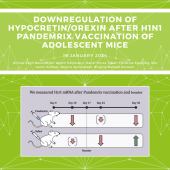
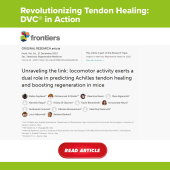



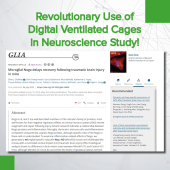
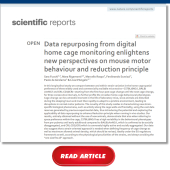

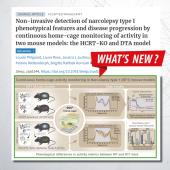


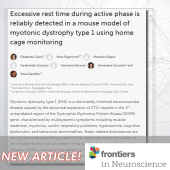

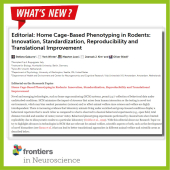
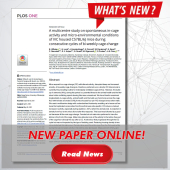

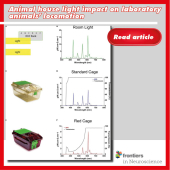


.jpg&maxw=190&maxh=170})
